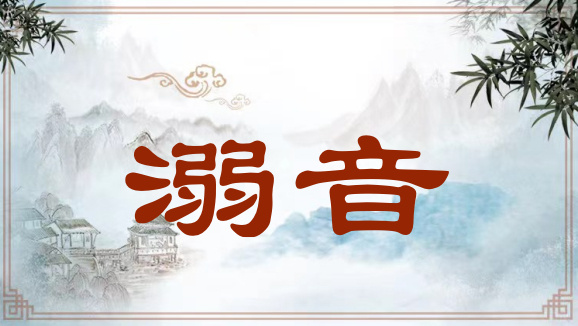溺音 Addictive Music

指使人沉溺而不能自已的淫邪音乐。“溺音”大致等同于“郑卫之音”。儒家认为春秋时期郑、卫等国的音乐浮靡轻薄,对社会的道德发展有害,因此是应予排斥的“溺音”。音乐是随着时代发展的,即使是在春秋时期,也有古乐与新乐之分。古乐是从古代流传下来、被儒家推崇的高雅音乐;新乐则是当代或后世新产生的通俗音乐。古乐的特点是高雅,它能使人心归正,符合儒家的道德规范,因此被称为“德音”。而新乐则扰乱人的心志,使人沉溺于感官的享受,对人的心志有害,因此被称为“溺音”。儒家提倡“德音”,反对“溺音”。
Addictive music allures and entraps people with its decadent tones. It roughly equates to "the music of the states of Zheng and Wei." Confucianism believed that the music of Zheng, Wei, and some other states in the Spring and Autumn Period was ornate and frivolous, harmful to the moral development of society. So it should be rejected as "addictive music." Music style changes along with the times. Even during the Spring and Autumn Period, both ancient music and new music were played. Ancient music was elegant, handed down from earlier times, and extolled by Confucian scholars. New music was popular with contemporaries or developed by later generations. Noble and graceful, ancient music could rectify people's minds and make them conform to Confucian moral norms. Therefore, ancient music was called "music conforming to virtue." New music, by contrast, disturbed people's minds and made them wallow in sensual pleasures, corroding their minds and will. It was thus referred to as "addictive music." Confucianism praised music conforming to virtue and opposed addictive music.
引例 Citations:
◎今夫新乐,进俯退俯,奸声以滥,溺而不止。(《礼记·乐记》)
现在流行的新乐,舞者进退都弯腰曲背,充满淫邪之声,使人们沉溺其中而不能自禁。
The vogue new music, brimming with lewd sounds, with dancers advancing and retreating with bent bodies, makes people addicted and unable to restrain themselves. (The Book of Rites)
◎(魏)文侯曰:“敢问溺音何从出也?”子夏对曰:“郑音好滥淫志,宋音燕女溺志,卫音趋(cù)数(shuò)烦志,齐音敖(ào)辟(pì)乔(jiāo)志,此四者皆淫于色而害于德,是以祭祀弗用也。”(《礼记·乐记》)
魏文侯问道:“请问溺音是从哪里来的呢?”子夏回答:“郑国的音乐轻佻放浪,令人心志淫荡;宋国的音乐纤柔妩媚,令人心志沉溺;卫国的音乐短促急速,令人心志烦乱;齐国的音乐傲慢邪僻,令人心志骄逸。这四个国家的音乐都偏重情欲而妨害人们的德行,所以祭祀时不会采用它们。”
Duke Wen of the State of Wei asked, "May I ask where the addictive music comes from?" Zixia replied, "The music of the State of Zheng is frivolous and unrestrained, making people lewd. The music of the State of Song is delicate and alluring, making people addicted. The music of the State of Wei is short and rapid, making people upset. The music of the State of Qi is overwhelming and eccentric, making people arrogant and debauched. The music of these four countries is too titillating and corruptive to public morals, so it is excluded from rituals." (The Book of Rites)
推荐:教育部 国家语委
供稿:北京外国语大学 外语教学与研究出版社
责任编辑:钱耐安





